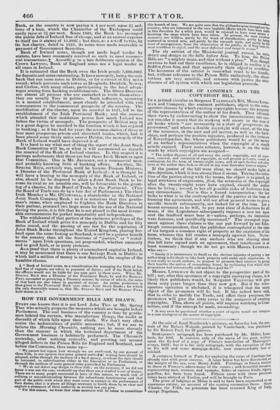THE IIOUSE OF LONGMAN AND THE COPYRIGHT BILL.
IN a printed circular on Sergeant TALPOURD'S Bill, Messrs LONG- MAN and Company, the eminent publishers, object to the retro, spective clauses by which existing copyrights become the property of the representatives of the author at his death. They advocate their views by endeavouring to show the inconvenience (we can- not consider it more) that its working will create in the ease of all books which " are necessarily in a state of progressive im- provement," and where a double copyright will exist, at the time of the reversion, in the new and old matter, as well as the hard. ships, and perhaps the positive injustice, produced in the instance of Encyclopaedias, &c. whose publishers would be at the mercy of an author's representatives when the copyright of a single article expired. Their main reliance, however, is on the usual words by which copyrights are assigned- " The author disposes of all and every the entire copyright, and all revel, 'lion, renewal, and extension of copyright, as well present as future, vested contingent, for the term of twenty-eight years, and all such further and other term as the author then had, or should at any time thereafter have or acquire."
If the justice of the hill were clear, we should make light of this objection, which is less strong than it seems. Taking the inten- tion of the parties along with the terms, the object is to guard, by legal strictness of expression, first, the reversion of the copyright after the twenty-eight years have expired, should the author then be living ; second, to bar all possible risks of forfeiture from any circumstance. Nor is this a forced interpretation : the law looks to what is in the contemplation of the parties at the time of framing the agreement, and will not allow general terms to give a specific benefit subsequently, not looked for at the time. Let a tenant covenant as he will, to pay rent clear of deductions for all taxes, if the Legislature subsequently imposes a new tax upon rent the landlord must bear it—unless, perhaps, its imposition were foreseen, and specifically mentioned.* The strongest argu- ment against these clauses is the one put forward by our Edin- burgh correspondent, that the publisher contemplated at the time of his bargain a common right of property at the expiration of his term, whereas this bill creates a monopoly against hint. Never- theless, we think that if any authors who are stirring about this bill have signed such an agreement, their interference is at least unseemly ; though we do not go with Messrs. LONGMAN, who say- " Surely it is unnecessary to dwell on the obvious injustice of passing a law authorizing individuals to take back property sold under such stipulations. Is it not really to Insult authors, to propose to promote their interests by giving their families the option of committing fraud, by reclaiming that which their progenitors had unreservedly sold and been paid for ?"
Messrs. Lormittax do not object to the prospective part of the bill ; nor, after this specimen of a copyright conveying clause, is it likely that publishers would, for Sergeant TALFOURD will give them sixty years longer than they now get. But if the retro- spective operation is abolished, it is whispered that the main object of the promoters will be lost. It has indeed been said, that in order to mollify the Trade, and effect their purposes, the promoters will give the sixty years to the assignors of existing copyrights. This, above all points, will require watching in Com- mittee, and if the attempt be made, unmasking.
• It may even be questioned whether a court of equity would not interpose in a case analogous to the matter of copyright.


























 Previous page
Previous page